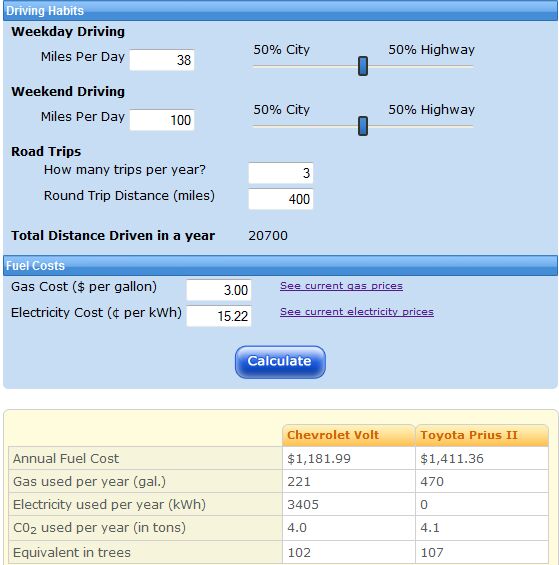Voltonomics 101: Your Costs Will Vary – Calculate Them Yourself Here

My initial self-appointed assignment was to come up with a comprehensive cost analysis of the Volt in comparison to the Prius and other vehicles. I first took this on two and a half years ago, and the results from that gazing-into-the crystal-ball exercise are actually still remarkably accurate, except for the Volt failing to meet its then-promised 50mpg fuel economy. The task, given the infinite variables, is essentially impossible, and thankfully, I was forwarded a link to this Electric Car Calculator. It’s far from perfect, given that it doesn’t account for depreciation, finance costs, leasing, maintenance, etc. What it does do is allow you to input your driving regime, both weekdays and weekends, electric and gas costs, and come up with a comparison for overall fuel costs with your choice of another vehicle; a good start:
I gave it a try, and decided to use my old driving pattern back in CA when I had a real job and commute; my current driving patterns would be totally wasted on a Volt. I compared the Volt to a Prius, but I did adjust some of the numbers manually. The Calculator uses EPA numbers; I brought the Prius number down to a real-world average of 44 mpg. And I lowered the Volt’s 40 mile electric range to 35, based on the many reviews. Even that might be too much, since my commute was almost all freeway. I also assumed the Volt’s gas mileage at 35mpg, and then lowered it to 32, to compensate for the higher price of premium fuel. Here’s how it came out:
In this comparison, the total fuel costs are almost identical for both the Volt and Prius. Note that “fuel cost” is a combination of electric and gas costs. My driving habits back then included several longer business and personal trips per week, which I factored into “weekend driving”.
I also used a 15.2 cents per Kwh electric rate, which is the average in CA. But that may be way too low, since tiered rates in CA go up to 40 cents.
Obviously, in this scenario, the Volt never begins to pay back its much higher purchase cost. It will probably take a pretty optimum driving regime to do that, or substantially higher fuel costs.
Try it out for yourself, and if anyone finds or comes up with something better, let us know.

More by Paul Niedermeyer
Latest Car Reviews
Read moreLatest Product Reviews
Read moreRecent Comments
- Analoggrotto so what
- Shipwright I wonder where Speedmaster is based. Oh Looky! it's China! who would have thought.
- Mike Wasnt even a 60/40 vote. Thats really i teresting.....
- SCE to AUX "discounts don’t usually come without terms attached"[list][*]How about: "discounts usually have terms attached"?[/*][/list]"Any configurations not listed in that list are not eligible for discounts"[list][*]How about "the list contains the only eligible configurations"?[/*][/list]Interesting conquest list - smart move.
- 1995 SC Milking this story, arent you?





































Comments
Join the conversation
Compared to my current vehicle (1990 Volvo 740 Turbo, 21 mpg), it will take over 15 years to break even. That's not including the aforementioned shortcomings in depreciation etc. And my Volvo is more fun to drive anyway (~300 hp @ 3000 lbs).
Thank you for your incredible response and feedback. We have updated the Electric Car Calculator with the following new features...in addition to calculating breakeven, we now calculate Cost Equivalent MPG for electric cars, tailpipe and upstream CO2 emissions, and also allow for diesel cars. The Electric Car Calculator is available here: http://www.befrugal.com/tools/electric-car-calculator